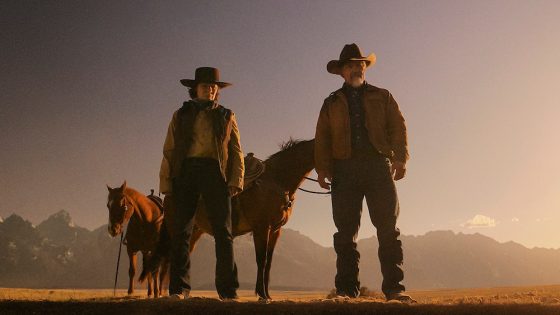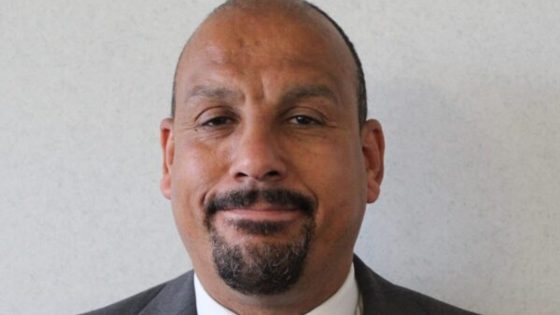SPOILER ALERT: This post contains spoilers from the entire second season of “Outer Range,” now streaming on Prime Video.
“It makes all the sense in the world!”
Forgive us for laughing, but that is the craziest thing someone could say about Prime Video’s “Outer Range,” a sci-fi western about a bottomless, time-traveling black hole on the Wyoming ranch of Royal Abbott (Josh Brolin). And yet, that’s what Royal’s nemesis Wayne Tillerson (Will Patton) proclaims right before he takes a swan dive into that hole in the Season 2 finale.
It’s a legitimately hilarious moment, because — even for those who have been paying attention — “Outer Range” isn’t the easiest to follow. But Brolin, who also serves as an executive producer and directs Episode 6, says if anyone understands the mysteries of the hole, it is Patton himself.
“There is something so organic about Will, and I don’t know if there is anyone I have more fun watching act,” he says. “Acting alongside him and directing him, he is a very instinctual, dangerous actor. If there is anyone who understands that life is uncertain and has learned how to embrace it, it is Will. So he’s the one of us who would understand the hole.”
But that may be beside the point by the end of Season 2. Let’s back up though. As revealed in Season 1, Royal traveled through the hole from 1886 as a kid after he had accidentally killed his father, and ended up being raised by the Abbott family in the 1960s. It’s a secret he kept until Season 1, when the hole reappears and his life spirals out of control. First, he tells his son Perry (Tom Pelphrey), who, while facing a murder charge, jumped in to escape his troubles. On the other side of that leap in Season 2, Perry finds himself living alongside a young Royal (Christian James) in the 1970s, as he comes to terms with abandoning his family.
Despite Perry’s less-than-ideal reaction to the hole, Royal widens the circle of those in the know in Season 2, first telling his wife Cecilia (Lili Taylor); and then their other son, Rhett (Lewis Pullman), who already had one foot out the door before the family turmoil brought him back in.
The hole means something different to each of the people exposed to its vast unknown. For example, after Wayne finds out his son Luke (Shaun Sipos) has killed his other son Billy (Noah Reid) in a real Cain-and-Abel kind of way, he sets his beloved wall of taxidermied owls on fire and demands answers from the hole. It seems to respond in a way that it doesn’t for others, giving enough prophetic insight into its meaning to want to dive in. But for Royal, Brolin says the hole is still just a manifestation of the shame he associates with it and the decades of lies he’s told about it.
“I think the idea of the hole still represents this horrific thing, because all it is doing is bringing chaos,” he says. “But the only reason it is bringing chaos is because of his reaction to it. So it is the mirror that he is dealing with again and again and again. I think he is trying to break that cycle when he brings Rhett out there this season. And I think for him, more than anyone, he is trying to break any habituation he is stuck in with the hole.”
Breaking that cycle and letting people in was the main focus for showrunner Charles Murray, who joined in Season 2 after show creator Brian Watkins exited the series. Murray points to a scene early in the season finale when Cecilia and Royal ponder how many people they think have come through or gone into the hole — a discussion that’s uncharted territory for Royal.
“That’s what is great about this season to me,” Murray says. “He now has people to have these conversations with. As opposed to what Season 1 was, which was about a secret on top of a secret that was slowly getting exposed and the frustration it is causing him. He doesn’t have to turn inward anymore.”
Autumn (Imogen Poots)
Courtesy of Prime Video
There’s also the matter of Autumn (Imogen Poots), the mysterious and persistently intrusive woman who showed up at the Abbott ranch in Season 1, only for Royal to discover she is Perry’s daughter and his granddaughter Amy (Olive Abercrombie) from the future. All season, Imogen has been mainlining “the mineral,” which oozes from the hole and gives those who ingest it a psychedelic trip that can be either a musical number (in the case of the musically inclined Billy, who sings throughout the series) or a peek into the future. Autumn is getting the latter, and her visions look a lot like the dark future Royal saw in Season 1 when she pushed him into the hole. During that quick trip, he climbed out into a future where Autumn was leading a yellow jumpsuit-wearing cult. Cecilia warned him that he died in this future, and he should run back to his time, which he wasted no time doing.
In Season 2, those glimpses of Autumn’s ascendancy become slightly clearer and scarier as she began to see her own potential with the mineral. But Murray warns no future is set in stone in a show that uses time like a Stretch Armstrong toy.
“The future is still in flux,” Murray says. “Who is to say someone can’t jump in and change it?”
Better question: Who’s to say they already haven’t? Two major divergences in the past have already occurred, with unknown consequences on the present. First, Sheriff Joy (Tamara Podemski) literally walked into the past to 1886 and spent four years living with a Native tribe this season, something that has left her with culture shock upon returning to the present. There, she found herself face to face with a young Royal and his father as she flees a bigoted, violent landowner. When Royal’s horrible father demands he kill Joy, Royal instead turns the gun on dear ol’ dad –– a vastly different version of that formative death than Royal previously remembers. He still flees to the hole and Joy follows him, but present-day Royal starts feeling his memories change because of Joy’s interference.

Deputy Sheriff Joy (Tamara Podemski) and Falling Star (Kimberly Guerrero)
Courtesy of Prime Video
Then, in the finale, Perry is pushed back into the hole by a young Royal, who tells him to go home and deal with his problems. But instead, he finds himself back at the fateful moment in the series premiere when he accidentally kills Trevor Tillerson (Matt Lauria) in a bar fight. Only this time, Perry disrupts the altercation, and his past (future?) self ends up dying instead. Seeing the opportunity for a second chance at taking care of Amy, he decides to dispose of his own body in the hole and live as himself in the not-so-distant past, effectively creating an alternate history that will likely come to bear on the main story.
“We live with time and what it is doing to people emotionally,” Murray says. “It was off of something Josh said about Season 1, that time was something Royal had to deal with emotionally. So whenever we ran into something, we asked what we needed to do to solve it emotionally. If you think about where Perry lands, that whole thing is about dealing with where he is emotionally and what he’s been running from. If you think about when Royal went into the hole in Season 1 and ends up in the future, it is about his fear of the future with the recurrence of the hole.”
In the final act of the season finale, Autumn pushes Amy into the hole after taking a bullet from Joy. Autumn dies from her wounds, only to be resuscitated when Amy wakes up in an undetermined time that looks relatively current –– however, the land is far more barren than the one she just left. Might she have fallen into a more desolate future where her future self reigns supreme?
In reaction to Autumn and Amy’s time-wimey mayhem, Royal has some kind of heart attack that leaves him hospitalized and dreaming of his own foreboding future. “Time is a river, Royal,” says a chorus of literally everyone he knows, past and present. When he awakens, he seems to have gotten the message, telling a shaken Joy that the future is coming and they need to stop it.
For the viewer, what’s to come couldn’t be cloudier, and Murray won’t divulge exactly what Royal sees ahead. But he does note that Joy never went through the hole to get to the past, so “there is no rulebook that says the whole town of Wabang isn’t a portal.” Brolin, meanwhile, doesn’t know what the future holds for him or Royal. But he admits he’s uncharacteristically willing to find out, if Prime Video gives them the chance.
“The idea of a Season 3 is very intriguing and not something I would necessarily, in most cases, look forward to,” he says. “Wanting to carry a character that far for that long, even the idea of doing a play for two years just sounds awful to me. You want to get in there, 12 weeks of work, have your impact, hope it is good and get out. I think that is much more my mentality, and it is why I got out of TV in the first place.
“But this is different. This has its hook in me. I don’t know exactly why. I don’t think any of us does.”
Source Agencies



